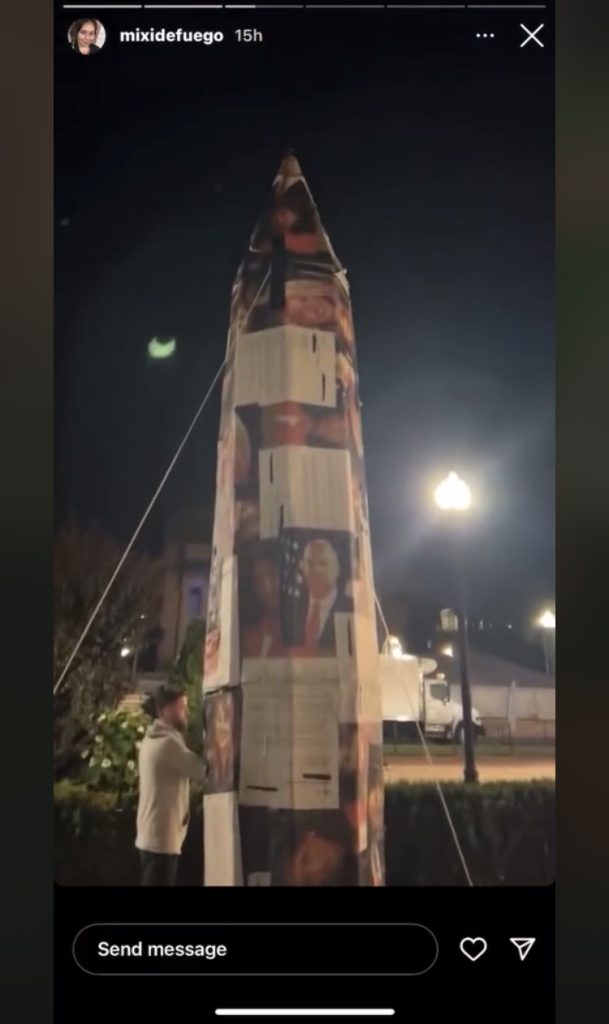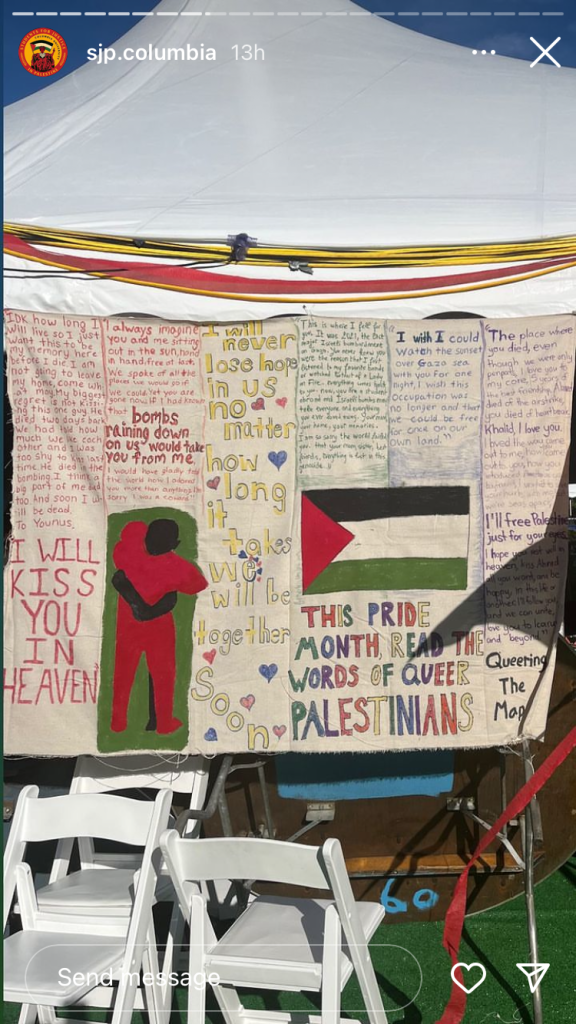“We’re back, bitches.” That is how student protesters at Columbia University announced the return of an anti-Israel encampment on the school’s main lawn, coinciding with the school’s alumni reunions, which took place over the weekend.
A sign declaring, “We’re back bitches,” greeted alumni returning to campus for their class reunions, as students pitched tents and congregated under a large structure the university erected on the school’s south lawn. The students also unveiled a cardboard missile plastered with photos of Columbia president Minouche Shafik and other university leaders, including the co-chairman of the school’s board of trustees, David Greenwald, and Abigail Black Elbaum, the vice chairwoman of the board.



Security officials entered the encampment Friday night and removed what Shafik later referred to in an email as “four unoccupied tents.” Students responded by occupying other tents, which security officials refrained from removing. The students slept in the encampment overnight, and it remains standing as of Sunday afternoon.
In addition to the security officials, university leaders “entered the encampment Friday night to initiate discussions with student leaders,” Shafik said in her Saturday email to Columbia community members, which was obtained by the Washington Free Beacon.
That decision, Shafik said, was “consistent with our mission as an educational institution.”
“We welcome this effort to establish dialogue,” she wrote, adding that as of Saturday afternoon, the encampment “consisted of seven tents, and most protestors had relocated to an adjacent, large-scale tent that had previously been erected by the university.”
The group ranged from 25 to 60 individuals at various times on Saturday, Shafik said. Student protesters dispersed from the encampment Sunday night but left behind a sign reading, “We’ll be back, bitches.”


But they’ll… ‘BE BACK BITCHES” pic.twitter.com/jto6iKTMHs
— Jessica Schwalb (@jessicaschwalb7) June 3, 2024
The ordeal comes just a month after Shafik engaged in protracted negotiations with student protesters who occupied the campus green during the academic year, pushing back four separate deadlines for students to clear out.
Those negotiations culminated in the protesters’ seizure of a university building and Shafik’s ultimate decision, on April 30, to call in the cops to clear the encampment and arrest the students who had occupied the building. The looming threat of disruption from the protesting students was also behind Shafik’s decision, on May 6, to cancel Columbia’s main graduation ceremony.
On social media, student leaders called president Shafik a “bootlicker” and asked visiting alumni to “withhold donations until all demands are met.”
Columbia did not respond to a request for comment.
Students in the new encampment, part of the campus group Columbia University Apartheid Divest, issued an array of demands, including that Columbia “end its complicity in the genocide of Gaza,” institute an academic boycott of Israeli universities, and offer amnesty to students and faculty members who participated in the encampments.
At least one student organizer in the new encampment, Mimi Elias, was suspended for her involvement in a March event that featured a member of a terrorist organization, the Popular Front for the Liberation of Palestine. Elias was back on campus participating in the new encampment Saturday night, according to social media footage reviewed by the Free Beacon.

Both before and after they dismantled the encampment, student protesters teased additional “disruption” this summer.
In their social media post outlining demands, the students pledged to keep “fighting until complete liberation.” A student organizer who requested anonymity, meanwhile, told the Columbia Spectator that Shafik would be “wrong” to believe the students would back down “because it’s the summer.”
“Columbia University thinks that just because it’s the summer, they don’t have as many classes, they don’t have as many students … that we’re tired, that we’re scared, that we’re not going to be on campus because they have a few ID checks,” the student said. “They’re wrong.” Student protesters later outlined a “summer of disruption” in a Sunday night Instagram post, pledging to “use this time to agitate, educate, and escalate.”
Beyond the cardboard missile, students displayed a “queering the map” banner in celebration of Pride Month featuring the “words of queer Palestinians.”

Access to the Ivy League campus remains restricted to Columbia affiliates with a valid identification card.
Update 7:35 a.m.: This post has been updated with additional information.














